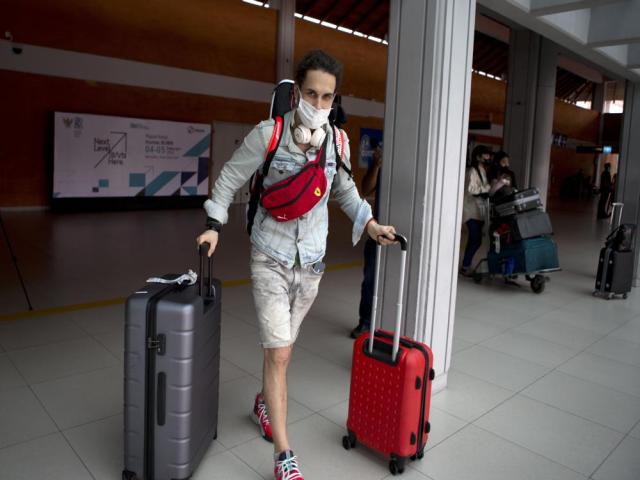Direct international flights to Bali have resumed for the first time in two years

DENPASAR, Indonesia (AP) — Direct international flights to Bali have resumed for the first time in two years as Indonesia opens the resort island to foreign travelers from all countries, but mandatory quarantine remains in place for all visitors.
Officials had said in October that Bali would welcome foreign arrivals from 19 countries that meet World Health Organization criteria, such as having their COVID-19 cases under control. But there were no direct international flights to Bali until Thursday, when Garuda Indonesia operated its first such flight in two years from Tokyo.
Singapore Airlines will introduce a regular direct route to and from Denpasar in Bali starting Feb. 16, said Taufan Yudhistira, the public relations manager at Bali’s international airport.
Fully vaccinated travelers need to quarantine for five days in a hotel or on a liveaboard boat certified by the Ministry of Tourism and Creative Economy, and travelers who have received one dose of COVID-19 vaccine must quarantine for seven days.
The country’s latest surge in cases, driven by the highly transmissible omicron variant, has mostly been concentrated in Jakarta, but in recent days infections have “increased significantly” in Java and Bali, said Coordinating Maritime Affairs and Investment Minister Luhut Binsar Pandjaitan, the government minister who leads the COVID-19 response in Java and Bali.
The quarantine for foreign arrivals is intended to prevent further spread of the virus, said Pandjaitan.
Before the pandemic, Bali’s airport accommodated more than 200 international flights with at least one million passengers per day in 2019. The island was closed to international flights after COVID-19 hit the world’s fourth most populous country in 2020.
Tourism is the main source of income in Bali, which is home to more than 4 million people who are mainly Hindu in the mostly Muslim archipelago nation. Bali’s tourist areas were deserted two decades ago after visitors were scared off by deadly terror attacks that targeted foreigners, but the island has worked to overcome that image.
The reopening of Bali to travelers from all countries will help boost the island’s economy, which has been badly affected by the pandemic, Pandjaitan said.
The reopening will also serve as a “trial,” said Tourism and Economy Minister Sandiaga Uno, as the government prepares to host G-20 events in Bali later this year.
A G-20 meeting of finance ministers and central bank governors in mid-February was supposed to be held in Bali but has been relocated to Jakarta because of the surge in COVID-19 cases. Some attendees will join the events virtually.
For more than two years, the isolation of the Pacific archipelago nation of Tonga helped keep COVID-19 at bay.
But last month’s volcanic eruption and tsunami brought outside deliveries of desperately needed fresh water and medicine — and the virus.
Now the country is in an open-ended lockdown, which residents hope will help contain the small outbreak and will not last too long.
“We have pretty limited resources, and our hospitals are pretty small,” Tongan business owner Paula Taumoepeau said Friday. “But I’m not sure any health system can cope. We are lucky we’ve had two years to get our vax rate pretty high, and we had a pretty immediate lockdown.”
Tonga is only one of several Pacific countries to experience their first outbreaks over the past month. All have limited health care resources, and there is concern that the remoteness that once protected them may now make helping them difficult.
“Clearly when you’ve got countries that have already got a very stretched, and fragile health system, when you have an emergency or a disaster and then you have the potential introduction of the virus, that’s going to make an already serious situation immeasurably worse,” said John Fleming, the Asia-Pacific head of health for the Red Cross.
Tonga was coated with ash following the Jan. 15 eruption of the massive undersea Hunga Tonga Hunga Ha’apai volcano, then hit with a tsunami that followed.
Only three people have been confirmed killed, but several small settlements in outlying islands were wiped off the map and the volcanic ash tainted much of the drinking water.
The nation of 105,000 had reported only one case of COVID-19 since the beginning of the pandemic — a Church of Jesus Christ of Latter-day Saints missionary returning to the island from Africa via New Zealand who tested positive in October — and authorities debated whether to let international aid in.
They decided they had to, but despite strict precautions unloading ships and planes from Australia, New Zealand, Japan, Britain and China, two Tongan men who worked at the capital’s Queen Salote Wharf handling shipments tested positive on Tuesday.
“Tonga is just out of luck this year,” said Samieula Fonua, the chairman of Tonga Cable Ltd., the state-own company that owns the sole fiber-optic cable connecting the nation to the rest of the world. “We desperately need some good news.”
The two were moved into isolation, but in tests of 36 possible contacts, one’s wife and two children also tested positive, while the others tested negative, the local Matangi Tonga news site reported.
It was not clear how many people might have come into contact with the dockworkers, but the government released a list of locations where the virus could have spread, including a church, several shops, a bank and a kindergarten.
Prime Minister Siaosi Sovaleni imposed an open-ended lockdown starting 6 p.m. on Wednesday. It could be particular arduous for Tongans because most have been without any internet connections since the volcanic eruption severed the fiber optic cable to the country.
One of the infected dock workers has since tested negative, but remains in quarantine, and 389 others have been cleared of COVID-19, Sovaleni told reporters in Tonga. But he said Friday that a primary contact to one of the people infected had tested positive, and ordered the lockdown extended another 48 hours.
The government has been primarily communicating with residents by radio addresses, and Fonua said his crews estimate they may have to replace an 87-kilometer (54 mile) section of undersea cable. They were hoping to restore service by next week.
It is not yet known what variant of the virus has reached Tonga, nor who brought it in. Officials have stressed that the aid deliveries were tightly controlled, and that it is not yet proven the virus came in that way.
Sailors aboard the Australian aid ship HMAS Adelaide reported nearly two dozen infections after an outbreak on board, but authorities said it had been unloaded at a different wharf. Crew members aboard aid flights from Japan and Australia also reported infections.
“The people are OK with the lockdown because they understand the reason why, so the corona doesn’t spread over our little country,” Tulutulu Kalaniuvalu, a 53-year-old former police official who runs a business, told The Associated Press. He added that most Tongans depend on crops they grow on plantations and hope the lockdown is short-lived.
Experience from elsewhere, especially with the prevalence of the rapidly spreading omicron variant, suggests that Tonga faces an uphill battle in trying to contain the outbreak, Indonesian epidemiologist Dicky Budiman told the AP.
Some 61% of Tongans are fully vaccinated, according to Our World in Data, but because the country has not yet seen any infections, there’s no natural immunity and it is not clear whether the shots were given long enough ago that they may now be less effective, Budiman said.
He recommended that the government immediately start offering booster shots and open vaccinations to younger children.

Unique And Hard Bike Boxes in Australia And USA
- These cases can be utilized in pushing your business as well. The plain development box of bicycles has sufficient free space for you to paint

What Type of Bike Delivery Box are Best for Dubai?
- A bike box is a portable storage container that is used to safely transport bikes between locations. They can be used

How businesses of all sizes need marketing
- How businesses of all sizes need marketing - no matter what it is they may do operationally.

High Rated Real Estate Advisors in Pakistan
- In every country there are professionals who help people with their real estate transactions. In Pakistan